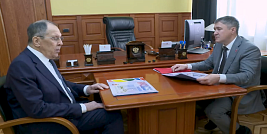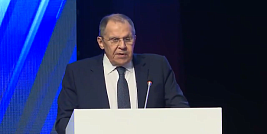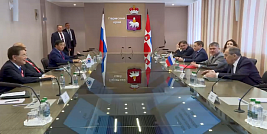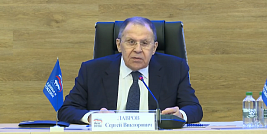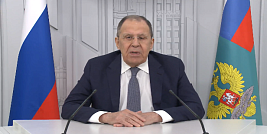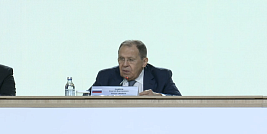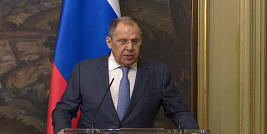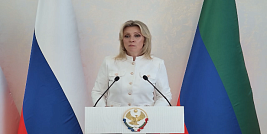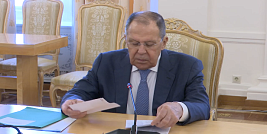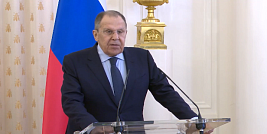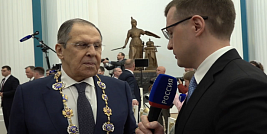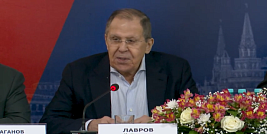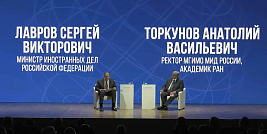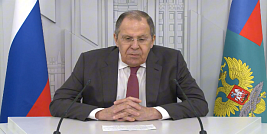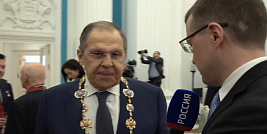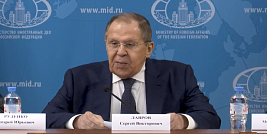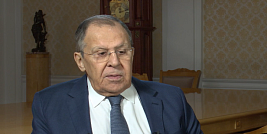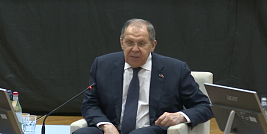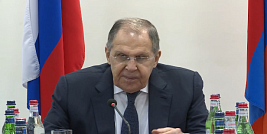Foreign Minister Sergey Lavrov’s statement and answers to media questions at a joint news conference following talks with Foreign Minister of the State of Eritrea Osman Saleh, Sochi, March 22, 2023
Ladies and gentlemen,
I had very substantive talks with Foreign Minister of Eritrea Osman Saleh.
I’m pleased to note that the bilateral political dialogue has become more stable. This is the second meeting with my counterpart since earlier this year. In January, a Russian delegation made a useful visit to Asmara to talk with President Isaias Afwerki and Minister Osman Saleh.
Today, we continued to discuss the specific issues that we discussed during the January visit. We agreed that we are indeed making progress in identifying the best forms of partnership in existing circumstances, when the importance of upholding international law and preventing diktat and hegemony in international affairs has become particularly clear all over the world, including Africa.
We specified further steps to promote the traditionally friendly Russia-Eritrea relationship and reaffirmed our mutual commitment to further strengthen our interaction. We paid special attention to promoting cooperation in order to fully unlock the significant economic potential.
We are interested in expanding the number of promising joint projects in transport infrastructure and agricultural production, as well as exploration and mining. We outlined the Russian companies’ interest in accessing the Eritrean market. Our Eritrean friends promised to come up with a proposal regarding areas of mutual interest where the Russian private sector could get involved. We agreed to help representatives of our countries’ respective business circles establish direct contacts.
We highlighted cooperation in training professional staff at Russian higher education institutions. We reaffirmed our willingness to increase state scholarship quotas allocated to Eritrea from the federal budget. We will take into account our Eritrean friends’ wishes regarding specialties that their students would like to master. In turn, my counterpart and friend made clear that training is a priority in Eritrea’s relations with the Russian Federation. Our estimates and plans overlap in this regard as well.
We also covered cooperation in the military and defence sphere and security in general. It is an important aspect of our interaction, given the situation in the Horn of Africa and ongoing tensions between the countries in that region. In its bilateral relations with the countries in question and as a permanent member of the UN Security Council, Russia is promoting constructive approaches aimed at pooling efforts and overcoming differences by striking a balance of interests. We are using these constructive approaches in stark contrast to some Western countries’ attempts to preserve instability and to constantly look for irritants in order to prevent the countries of the region from uniting on a positive and constructive foundation.
We discussed preparations for the second Russia-Africa summit to be held in St Petersburg in late July.
We have analysed regional and international issues as they apply to
We expressed gratitude to our Eritrean friends for their consistent and principled position regarding the geopolitical processes launched by the West under the pretext and the cover provided by the
You are aware that the special military operation was provoked by
We will continue to support each other with regard to other fundamental items on the agenda of the international community, including as part of the UN activities on human rights issues, which the West is constantly trying to politicise and to use human rights issues as a pretext to interfere in the internal affairs of sovereign countries.
We are promoting joint approaches that reflect the actual state of affairs in energy and food security around the world. We are in favour of these issues being considered with account taken of the interests of all countries, rather than in line with the logic that the
We covered the situation in the Horn of Africa,
Speaking of the UN, we cannot elide the topic of UN reform, in particular reforming of the Security Council. Our position here remains unchanged. We see the blatant, glaring underrepresentation of developing countries at the UN Security Council. We support reforming this central UN body solely by making additional seats available to the countries of Africa, Asia and
I thank my colleague for a useful and productive meeting that will help advance our practical cooperation across all areas.
Question: This week the US Department of State accused Eritrea of war crimes committed in Ethiopia. Why does the US arrogate to itself the moral right to judge other countries? And who is going to condemn US war crimes around the globe?
Sergei Lavrov: I cannot but agree with my colleague. On a bigger scale, the US never concealed that it views itself as an “exceptional” power and that this exceptionality encompasses all areas including international relations and the appropriated right to judge people, all by themselves, without any legal process. When a legal process concerns the US in an international context, the US can easily “punish” those who question their right to dictate their will to everyone and to violate any written and unwritten rules and laws.
The situation with the International Criminal Court is the talk of the town today. Let me remind you that in 2007 a prosecutor of the ICC (a representative of developing countries) launched an investigatory case of the war crimes committed by the US and US-led coalition in Afghanistan. Washington responded in a simple way – it announced sanctions against the prosecutor and other ICC staff, and the case was closed.
At present, the International Criminal Court is headed by Karim Ahmad Khan, a naturalised Anglo-Saxon. He executes the orders of his masters which forbid the Court to investigate crimes committed by NATO member states, and pushes it to look for made-up pretexts and non-existent facts so as to promote the collective West’s agenda.
This is what the US is up to. I believe that everyone dislikes this behaviour, undoubtedly, even most of Washington’s allies. Such behaviour spells trouble. One can’t claim to be exceptional while violating international law here, there and everywhere, and very often breaking one’s own rules as well as constantly meddling in affairs anywhere in the world under murky pretexts except for the aspiration for complete dominance everywhere to the detriment of solving huge problems in the United States which still have to be addressed.
Question: While Vladimir Putin and Xi Jinping were meeting in Moscow, armed extremists shot nine Chinese citizens in the Central African Republic, and during these days riots broke out in Kenya. Can the developments in Africa be swayed artificially, especially while Russia is building up relations with the African continent?
Sergey Lavrov: We are concerned with the situation in the Central African Republic following this incident in which extremists attacked Chinese workers killing nine of them. We are not surprised that unrest broke out in Kenya at the same time. Our Western colleagues constantly demand that African leaders, leaders of other countries follow their advice. And those who show the least independence are subject to various provocations from the West.
I can neither confirm nor deny that this was the case this time as well. I said that I can’t rule it out, because there are developments in the economy and the social sphere that can cause protests and objections from the population. But in most cases, the West seeks to either create such situations or use them to its advantage. You do not have to look far for examples: just look at the European continent. While in Georgia the protesters, who were obviously encouraged by the West, were elevated to the rank of fighters for freedom, human rights, democracy in every possible way, those processes that took place in Moldova were regarded differently: in a way that served the interests of the West. The suppression of protests in Moldova was actively supported, and the suppression of protests in Georgia was called an attack on democracy.
We have no illusions. In addition to behind-the-scenes incitement, the West publicly demands that African countries stop supporting Russia, stop being friends with it with China, and reorient their economies towards Western countries. This is said openly, during official visits by American and other officials to the continent.
There was an interesting episode recently. The German ambassador complained to the President of Namibia at his reception that there were too many Chinese in the country. No proof is needed to see that this unethical statement is outrageous. For some reason, they consider themselves entitled to give such lectures to the presidents of African countries. This is neo-colonial thinking, which is categorically rejected by Africans and by us. Namibian President Hage Geingob gave the ambassador of Germany a useful lecture. I do not know whether it worked, but I believe it important that it reflected the principled position of Namibia.
Question (addressed to Osman Saleh): Last year your country did not support an anti-Russia resolution at the UN General Assembly thus highlighting your attitude towards Russia’s special military operation in Ukraine. Was that decision followed by attempts by Washington or its allies to contact you or somehow to pressure you into changing your stance?
Sergey Lavrov (adding after Osman Saleh): I think Eritrea was not the only country the US did not invite for the US-Africa Leaders Summit. There were several other countries that were left out.
Now Americans are going to hold the Summit for Democracy against autocracy. They invited a fairly peculiar group of countries which do not always meet the US criteria of democracy yet they are following in the footsteps and along the lines of Washington’s foreign policy and therefore are deemed worthy to participate in the summit. The Americans decide for themselves who should be called “democrats” and who shouldn’t, and also who is to be labelled “autocrats.” Nowadays Washington determines loyalty (it is obvious) not by commitment to some democratic values which are global and abstract. You may be considered a democracy if you support the US Democratic Party’s policy. But in addition to the right the US has arrogated to itself to identify a democrat and an autocrat, in the case of the summit with African leaders they also appropriated the right to reshape Africa’s geography because the US-Africa Summit did not include all the countries of the continent. So ultimately the United States undertakes the functions of Our Lord who created our sinful Earth.
Question: There were reports yesterday that the British authorities are going to send depleted uranium munitions to Ukraine. President Vladimir Putin has already commented on this intention of London. Can you specify which steps Russia is ready to take if such munitions are delivered?
Sergey Lavrov: As many commenters said yesterday as a follow-up to the statements made by President Vladimir Putin and Russian Defence Minister Sergey Shoigu, it marks a move towards further escalation that is serious and qualitatively different.
Western representatives say “it’s no big deal,” “nothing in the depleted uranium munitions category is banned,” “we are not violating any conventions.” However, everybody remembers the outcome of the use of depleted uranium shells in Yugoslavia and Iraq. Tens of thousands of civilians were affected and also actually the NATO service personnel who used those depleted uranium munitions. There was a spike in cancer cases and other serious diseases. The soil has been contaminated for decades.
This touches on the West “caring” about increasing agricultural production in Ukraine and the export of Ukrainian grain to developing countries including Africa. The use of depleted uranium shells will sharply cut (if not wipe out) Ukraine’s capacity to produce high-quality non-contaminated food.
Regarding the absence of an international convention banning the use of depleted uranium munitions, there is indeed no such convention as of yet. A number of countries are obstructing the drafting of this document, including the major Western countries. Indicatively, in the absence of the convention, the UN General Assembly regularly considers resolutions calling for an end to the production and use of depleted uranium munitions, and each time the UK, the US and France are three of the few countries who always vote against such resolutions. You be the judge.
Regarding our reaction. We will definitely factor this into our actions. We have a commitment to the international rules of warfare. We have our own military doctrine. As per President Vladimir Putin’s and Defence Minister Sergey Shoigu’s statements, we will be forced to take into account that our British colleagues are entering a new grave stage of escalation.
